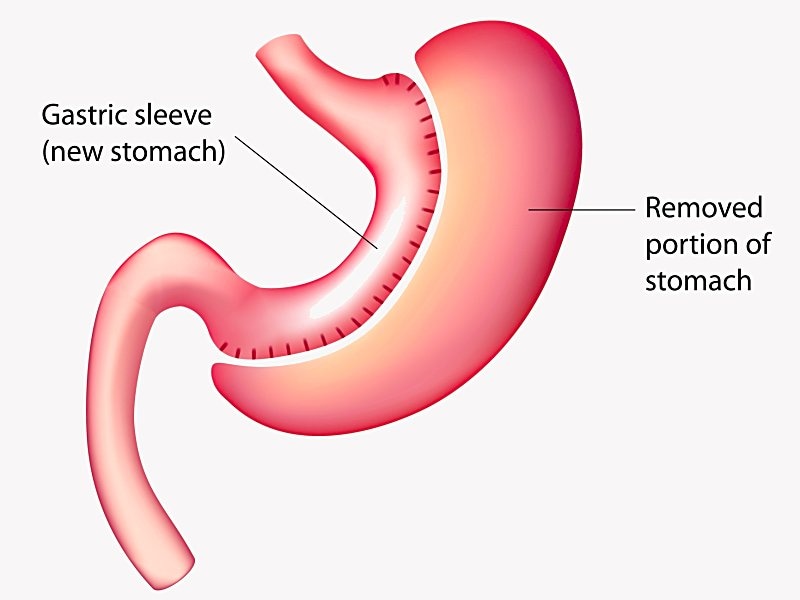
This is the first comprehensive report of a prospective cohort study, comparing sleeve gastrectomy (SG) with gastric bypass (GB) regarding their effectiveness and safety. *Everyone loses weight at there own pace. Bariatric surgery is an effective treatment for obesity and its associated comorbidities. They found acid reflux in 57 and Barrett’s esophagus in 14, (6/44), of gastric sleeve patients. Participants were divided into three groups. Sleeve gastrectomy, gastric bypass associated with similar quality of life improvements 36 years). Is Gastric Sleeve Worth it? Real Patient Reviews After more than 10 years, following sleeve gastrectomy, the authors re-examined 44 of 65 non-converted patients using upper endoscopy, manometry, 24-hour pH-metry and questionnaires. A fast food addict who splashed out £800 per month on takeaways says she’s excited to flaunt her 10-stone weight loss on her first holiday in years thanks to a gastric bypass.Life After Gastric Sleeve Surgery – Everything You Need to Know.
In less than a year I reached 110lbs and now, 10 >years later, I am maintaining a healthy weight of 128lbs.I had RNY gastric bypass 10 years agoit was the best decision I made.
GASTRIC SLEEVE 10 YEARS LATER SKIN
Losing weight too quickly can cause loose skin or stretch marks. Just remember losing weight at an accelerated rate is not always a good thing. In order to determine the amount of weight you will lose after gastric sleeve surgery, use our Weight Loss Calculator. We also see significant improvements and/or remission in obesity-related comorbidities such as type II diabetes, high blood pressure, high cholesterol, and obstructive sleep apnea.

Our data show a strong correlation between the amount of excess weight loss with following the post-op diet, exercise routine, and healthy lifestyle habits. "Both procedures resulted in good and sustainable weight loss at 10 years," the authors write.At Mexico Bariatric Center®, we see patients more often lose 80% to 100% of their excess weight within the first two years after vertical sleeve gastrectomy.

The reoperation rate was similar between the groups. Three patients (13.6 ) in the SG group and 5 patients (22.7 ). After LSG, esophagitis was more prevalent, but there were no significant differences for BE. The incidence of gastrointestinal leaks after a gastric sleeve surgery tends to vary in each research study, depending on their procedures and methodology. Results: Average 10-years EWL was 48.8 in the SG group and 61.8 in the RYGB group (p<0.05). Following LRYGB, hypertension remission was superior. There was no statistically significant difference seen between the procedures for type 2 diabetes remission, dyslipidemia, or obstructive sleep apnea. The researchers found that the median percentage excess weight loss was 43.5 percent after LSG and 50.7 percent after LRYGB, with the mean estimate percentage excess weight loss higher in LRYGB (8.4 percent). Cheese, bacon, avocados, and butter are all fine. Yes I was in the lazy keto camp before surgery and now (18 months later ). The analysis included 240 patients (aged 18 to 60 years) randomly assigned to LSG (121 patients) or LRYGB (119 patients). Once fully recovered, most sleevers can tolerate any kind of food, just not the quantities that they did before surgery. 15 Symptoms include: Bloating Feelings of fullness Upset stomach Acid-reducing medication can help improve GERD symptoms.

Paulina Salminen, M.D., Ph.D., from Turku University in Finland, and colleagues compared 10-year outcomes of weight loss and remission of obesity-related comorbidities and the prevalence of gastroesophageal reflux symptoms, endoscopic esophagitis, and Barrett esophagus (BE) after LSG and LRYGB. Heartburn and other symptoms of gastroesophageal reflux disease (GERD) are common complications of gastric sleeve surgery and can show up even a year after the procedure.


 0 kommentar(er)
0 kommentar(er)
